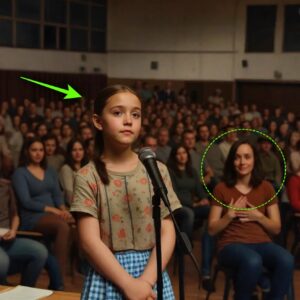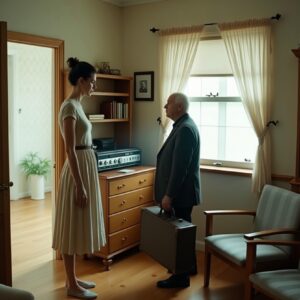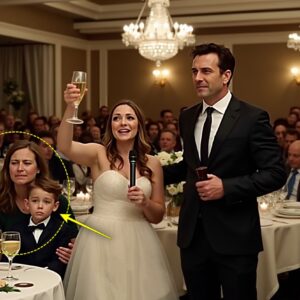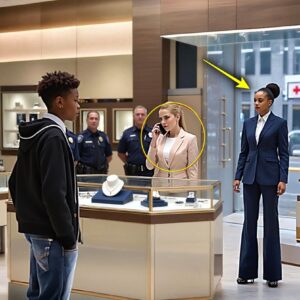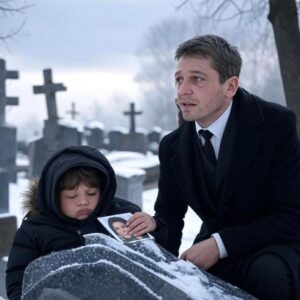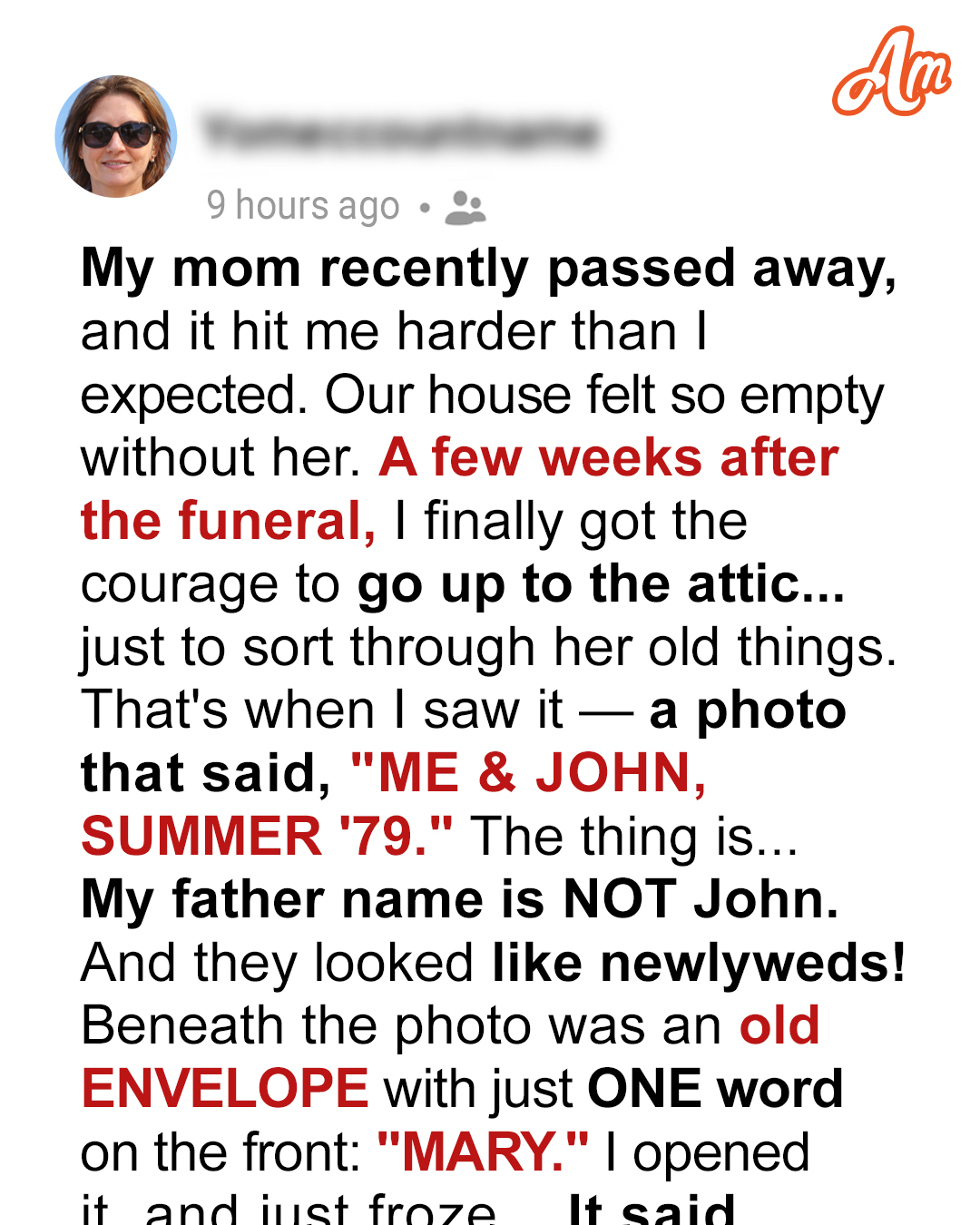
While sorting through my late mother’s attic, I found a sealed letter addressed to her—no sender, no date. The first line chilled me: “I’m sorry it took me so long…” What followed unraveled everything I believed about my family… and myself.
I’d never liked the attic. Even as a little girl, I’d run past the narrow staircase like it might reach out and grab my ankle.
It always smelled like dust and winter and all the things we don’t say out loud. Like the attic itself had secrets.
But after Mom passed, something changed. Her voice was gone from the kitchen, her slippers weren’t by the door, but upstairs—where the air was still and quiet—she lingered. I couldn’t explain it, but I felt pulled there.
Maybe it was the creaking boards that sounded like footsteps.
Maybe it was the way the sunlight slanted through the old slats, lighting up the dust like whispers.
I climbed the stairs slowly, holding the railing like it might fall apart in my hand. At the top, the air was cooler, and I felt the wood give just a little under my feet. The attic hadn’t changed.
Same piles of boxes, same old rocking chair in the corner. I sat down on a faded quilt for a while, just breathing her in.
The closet was where she kept what she couldn’t let go.
I opened the old wooden door. Its hinges groaned like it hadn’t been touched in years.
Inside were things I hadn’t seen since I was a child—my first drawing, folded and yellowed, crayon marks still visible through the creases.
A broken rosary hung from a nail, its beads scattered like tears at the bottom of the shelf.
Next to it, an old pocketknife that didn’t look like anything my dad would’ve owned.
And then, tucked behind a stack of books, was the box.
It wasn’t big—just a shoebox, edges frayed, like it had been opened and closed a hundred times. I set it gently on the floor.
Inside were postcards, faded from time, the ink barely legible. The handwriting was old-fashioned, careful.
There were photos too, black and white, one of them showing Mom with a man I didn’t know.
He had dark hair, a soft smile, his arm around her like he belonged there. But he wasn’t my dad.
And then I saw the letter.
It was sealed, the envelope slightly yellowed. No return address. Just one word written in cursive: Mary.
My hands shook like wind through corn stalks as I opened it.
“I’m sorry it took me so long…”
The words hit me like cold water. The handwriting leaned to the right, rushed but full of feeling, like every sentence was pulled from a deep place.
He wrote about her laugh. About summer fields and the way they used to lie on the hood of his car and talk about nothing.
He wrote about a kiss behind the high school gym.
And then—
“I still wonder if she ever told you. I always hoped she would.”
I let the letter fall. My heart beat like a drum in my chest.
I picked it up again. Read the line three times.
He wasn’t just someone. He was someone important.
The man I had called my father—David—wasn’t the man who made me.
I wasn’t just mourning my mother anymore.
I was mourning the truth.
I didn’t sleep that night. Not a wink. I just lay there in the dark, staring up at the ceiling fan. It moved in slow circles, over and over again.
I counted the rotations like I used to count stars with Mom when we’d lie in the grass behind the house, back when everything felt safe and simple.
But nothing felt safe anymore. My breath was heavy, like I was dragging something behind me—something old and buried.
It was like the walls were full of memories, and now they were whispering them back to me, one by one.
Around 3 a.m., I sat up, flipped on the lamp, and pulled the box onto my bed. The same box from the attic.
I opened it again, even though I already knew what was in there. Letters. Photos. A broken piece of time.
I read every letter, every note, every torn corner. My fingers traced the edges of the black-and-white photos.
Most showed my mom smiling, sometimes with friends, sometimes alone. But in a few of them, there was a man beside her. Always the same man.
He looked about twenty in the pictures—dark hair, wide grin, eyes that looked like they’d seen both trouble and charm.
He had his arm around Mom like he belonged there, like he’d always been part of her world. And in those photos, she didn’t look like my mother. She looked like a girl in love.
On the back of one picture, in faded ink, it said: Me & John, summer ’79.
John.
That name kept showing up in old birthday cards and short letters tucked into the box. Over and over again. Like a weed pushing through the cracks of everything I thought I knew.
I sat still, holding the photo. My hands trembled. Then I thought of Mrs. Natalie. She used to sit with Mom on the porch every Sunday afternoon.
Iced tea in tall glasses, lemon slices floating on top.
They always spoke in soft tones, leaning in like they were sharing secrets.
By sunrise, I was in my car. I drove through quiet streets, the kind of silence that feels like a church after everyone’s left.
Mrs. Natalie opened the door like she had known I’d come. Her hair was still in soft curlers, and she wore her old pink robe.
“Sweetheart,” she said, pulling me in and holding my face in both hands, “grief makes us dig up more than graves.”
I blinked fast, trying not to cry. “Do you remember someone named John?”
She didn’t speak right away. Her mouth pressed into a thin line. Then she nodded. “He was her first,” she said. “And maybe her real one, too.”
“What happened to him?”
Mrs. Natalie looked off toward the window, her voice quieter. “He left. Quick. One day he was here, next day gone. I always figured Mary pushed him away.”
“Why would she do that?”
She sighed, then whispered, “Because she was already pregnant. And scared.”
The air felt thick all of a sudden. I pressed my hand to my chest.
“Do you know where he went?”
She paused, then walked to the kitchen. She came back with a torn grocery list. On it, she scribbled the name of a small town.
“Last I heard,” she said.
I took the paper and held it close, like it was a treasure map. Maybe it was. Maybe it was the only way to find the truth.
The town was small—so small it felt like I could blink and miss it. A single street ran through it like a thread, tying together all the pieces.
There was one diner with a flickering neon sign that buzzed in the heat, a gas station where the pumps looked older than me, and a thrift store that smelled like cedar, dust, and maybe a little sadness.
The clothes were faded, the shelves cluttered with chipped glassware and forgotten toys. Everything felt like it had a story, tucked away and waiting.
I walked with slow steps, asking strangers about a man named John. Most folks shook their heads politely or offered a soft “Sorry, no,” before moving on with their day.
I almost gave up, thinking maybe this was a dead end. But at the post office, behind the glass window, a woman with short gray hair and bright eyes squinted at me.
“John?” she said, tapping her lip with a pen. “White bungalow. End of Pine Street.”
My heart thumped as I drove down the quiet road, past old mailboxes and laundry hanging in yards.
The white bungalow looked plain, but cared for—paint a little chipped, lawn trimmed just enough.
I parked and stood for a moment on the porch, hand hovering over the screen door like it might bite.
I knocked.
The door creaked open. A man stood there, tall but a little stooped. He wore a red flannel shirt and jeans with a worn-out hole in one knee.
His face was lined, sun-kissed and serious. His eyes were the color of wet bark, deep and searching.
“Yes?” he asked, voice calm but cautious.
“I… I think you knew my mother,” I said. “Mary.”
His face didn’t change much, but something flickered in his eyes—recognition, maybe, or something like it.
“You’re her daughter,” he said. Not a question. A fact.
I nodded. “Yes.”
He held the door open wider. “Come on in.”
The house was quiet. There was a smell of old books and coffee. Faded curtains fluttered at the windows, and a clock ticked somewhere in the back.
He motioned toward a chair at the small kitchen table. I sat.
He poured coffee into a chipped mug, set it in front of me with both hands, like it was something important.
“She never wrote back,” he said after a long pause. “But I kept hoping.”
I looked down at the mug. “She never told me.”
He sighed. “I didn’t know either—not until years later. Someone from back home mentioned she’d had a baby. I thought maybe…”
“Why did you leave?” I asked quietly.
He stared out the window, his voice like dry paper. “My brother got arrested. My dad got sick. Things got heavy. Life… it cornered me.”
“And Mom?”
His voice softened. “I never stopped loving her. But when I came back, she was married. People said she was pregnant.”
“She was,” I said. “With me.”
He turned to face me. His eyes glistened, but he held steady. “Then I guess I didn’t come back fast enough.”
When I got home, I didn’t go inside right away. I sat in my car with the engine off, windows down, listening to the wind rustle through the trees.
My fingers gripped the steering wheel. I watched the house like it might change before my eyes.
Everything looked the same—same porch, same flower pots, same screen door that never closed right.
David—my dad—was out front, fixing that screen door again. He always did that in the spring, like clockwork. A small thing that made the world feel steady.
He saw me and waved with his screwdriver. “Hey, bug,” he said, wiping sweat off his forehead with the back of his hand.
I hadn’t heard that nickname in years. It hit me harder than I expected. My throat tightened.
“Can we talk?” I asked.
He didn’t ask questions. He just nodded and walked over to the porch steps.
We sat side by side, like we had so many times before—during thunderstorms, during good report cards, during bad days.
I told him everything. About the attic. The box. The letter. John.
He didn’t flinch. Didn’t raise his voice. Just stared out toward the yard. “I always wondered,” he said after a while.
“There was a look in her eyes back then—like she was holding something she didn’t want me to see.”
I reached for his hand. It was rough, warm, familiar. “You raised me. You’re my father.”
He turned to me then, gave me a soft, tired smile. “Blood is cheap, honey. Love costs more. And I paid it gladly.”
That night, I finally let the tears come. Not for the man I never met, but for the man who never left.
Weeks passed. I visited John again. He showed me photos, a high school ring, letters he’d never sent. He wasn’t trying to be my dad—he just wanted to know me.
We planted tulips in his yard. Mom’s favorite. He asked if I liked painting. I told him yes. I didn’t mention it came from her.
One morning, he gave me a photo of him and Mom at eighteen, their arms around each other, eyes bright with beginnings.
“She was my fire,” he said.
“I know.”
Later that day, I visited David. We grilled pork chops and talked about the garden. He told me he was thinking of repainting the fence.
“White,” he said, “like the wedding dress your mom wore.”
“You hated that color,” I teased.
“Maybe I’m learning to like things I never understood before.”
And just like that, the past stopped haunting me. It didn’t vanish—but it softened.
Now, I keep that letter in my nightstand. Not as a wound, but as a reminder.
Of love found. Love lost. And love that never left.
Tell us what you think about this story, and share it with your friends. It might inspire them and brighten their day.
If you enjoyed this story, read this one: When my best friend met my husband for the first time, they made awkward eye contact—but I brushed it off. Hours later, his angry outburst at her over a bag of chips made my heart stop. “I told you a hundred times not to do that,” he said. But how could that be? Read the full story here.
This piece is inspired by stories from the everyday lives of our readers and written by a professional writer. Any resemblance to actual names or locations is purely coincidental. All images are for illustration purposes only.
